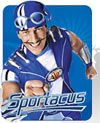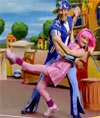Most experts advise against letting your child watch too much TV and there are numerous studies showing the problems associated with kids who watch TV for several hours a day. But LazyTown is the exception to that rule. This is a TV show that you want your kids to watch.
“LazyTown is the only global children’s entertainment brand dedicated to kids’ health,” explains Suzanne Noble, PR and Marketing Director for LazyTown Entertainment. The show began 20 years ago in Iceland, where Magnus Scheving – who plays the character ‘Sportacus’ – wanted to make health information for kids fun.
Click the picture to watch a clip of the show.
The show, which airs on eTV on a Wednesday and Sunday has grown in popularity as parents have latched on to the concept of the show, is focused on health education for children. Scheving was in South Africa recently at the 7thVitality Wellness and Fitness Conventionwhere his enthusiasm and passion for the show’s message was abundantly clear to all.
As the Creator and CEO (and character Sportacus), he passionately described how the challenge was to make the education about healthy lifestyles entertaining – but at the same time creative, smart and irresistible. He wanted story lines that were good and production values that were high, believing that kids shouldn’t be patronised.
Where the show began
Noble says the idea for a ‘lazy town’ came about from the awareness that there’s no-one who hasn’t been lazy at some point, “but we can also be healthy and active in spite of ourselves – it just takes a bit of thought and a bit of balance”.
An example of the show’s message is that “the occasional burger won’t hurt you, but if you ate nothing but burgers it wouldn’t be a healthy balance. Our bodies were built for movement and that needs good nutrition – lots of fruit and vegetables – or Sports Candy as it’s called in LazyTown,” Noble adds.
Scheving is a health educator in Iceland and was adamant that the core principle of the show was to never short change the kids - which means you're unlikely to find a LazyTown logo on a candy bar, for example.
Magnus Scheving as the super-fit and healthy 'hero' Sportacus.
“We know from our own research questionnaires with parents that kids have shown a change in what they want to eat – more fruit and vegetables – but also from the parents we meet who tells us that kids are actually asking for ‘Sports Candy’ and wanting to drink water rather than sodas, go running and do star jumps because they want to be like Sportacus and Stephanie,” says Noble.
The hero’s and the villians
Just like any good show, LazyTown has it’s share of villians and hero’s. In this case the hero is Scheving as Sportacus and his side-kick Stephanie who play the parts of the ‘good guys’ and are the most popular characters, followed by Ziggy, Stingy, Pixel and Trixie.
Noble says kids identify with these characters too because they represent some of the things kids struggle with such as sharing, having a sweet tooth, wanting to play on computers rather than get some exercise.
Sportacus and his side-kick Stephanie
The ‘villian’ or ‘anti-hero’ is Robbie, a character determined to keep LazyTown’s boys and girls as lazy as possible despite all of Sportacus’s best intentions.
The reality – kid will always watch TV
In an ideal world children would all play outside in the fresh air and get enough exercise and want to eat healthy, fresh fruit and vegetables. But the reality is vastly different and for many parents who both have to work, the TV is sometimes nothing short of a God-send when it comes to keeping the kids entertained.
The people from LazyTown know this and have decided to use it to benefit kids and their parents rather than fight it.
“We are never going to stop kids watching TV, the genie is out of the bottle on that one, but if we can provide really fun entertainment, which lies at the heart of everyone of the LazyTown TV shows, first and foremost, and alongside the fun there are some good messages about eating healthily and being active, then it’s a double win,” says Noble.
Dr Tracy Kolbe-Alexander from the UCT/MRC Research Unit for Exercise Science and Sports Medicine is the mother of four children aged between 19 and five years old and knows better than anyone the daily battle to keep kids away from the TV.
“It’s a challenge to ensure that they do not spend too much time watching TV. We have a rule, that during term-time, they can only switch the TV on at 6.30pm and absolutely no TV before school. At weekends I have to ensure that they don’t spend all day watching TV so I try to encourage them to play before watching TV, or do an activity with them. I think that as soon as I engage with them, especially the boys, they are less tempted to watch and play outside with me, or do puzzles etc. But I do find it challenging controlling screen time,” she says.
How lazy are SA's kids?
Kolbe-Alexander is also one of a team who worked on the recently released Healthy Active Kids South Africa Report Card 2010, which made some startling discoveries about how lazy South African children have become.
“Based on the recent Youth Risk Behaviour survey, when we compared the results from the 2002 and 2008 surveys we found that South African high school kids are spending a lot less time being physically active in both moderate intensity and vigorous intensity exercise.
“Conversely, this survey showed that there are more children that are not participating in sufficient physical activity and they are spending more time watching TV,” she explains.
Yet while a show such as LazyTown would be preferable to most other shows on TV, it is also only on twice a week and in-between that children are watching other less education shows which not only provides little stimulation, but also keeps them inside and sedentary when they could be outside playing and burning off energy.
So what can parents do to combat this?
Kolbe-Alexander has the following suggestions:
- Find opportunities to be active. Try to centre family outings around a physical activity such as going ice-skating, or for a walk, or a bike ride in a safe place.
- Encourage the children roller-blade / skate board / scooter while parent runs, or dance with them to their favourite song.
- Go for walks around the neighbourhood or on a mountain, beach, or at the zoo and use it as an opportunity to have some quality time as a family.
- Teach your child games you played as a kid – such as tag, hopscotch, and other traditional games.
- For those who belong to a gym – take kids along – some of the gyms have great kids active programmes.
- Encourage extra-mural activities that at physically active – but be careful not to over commit your child as they also need some ‘free’ play.
- Try to give gifts that encourage physical activity: eg, balls, skipping rope, scooter, bicycles, swing ball, roller-blades, skateboard.
- Be a role model – be physically active yourself.
Why your children need to exercise
“I cannot emphasise the importance of exercise enough. As a society we are losing the usual outlets for simple movement, even through daily routines such as using the vacuum cleaners versus sweeping with a broom. This has also led to children having less opportunity to be physically active.
“Many children don’t walk to school anymore, and for those who do, they might associate walking with poverty, which is a perception which also needs to be changed.
“There are more and more children being diagnosed with type II diabetes – which was primarily an adult onset disease. Thus these kids are at increased risk of many more health problems and should be encouraged to engage in play, but exercise must be fun and enjoyable and not seen as a chore or punishment,” she says.
And apart from the physical benefits your child will get from spending an hour outside int eh fresh air exercising in a fun way, there are numerous benefits of physical activity in kids including:
- Improved cognitive performance at school
- Provision of a setting for kids to interact and socialise
- It provides an opportunity to learn how to solve problems
- Teaches kids how to learn to win and lose.
Sources: Dr Tracy Kolbe-Alexander (PhD) UCT/MRC Research Unit for Exercise Science and Sports Medicine; Suzanne Noble, PR and Marketing Director for LazyTown Entertainment.
(Amy Froneman, Health24, August 2011)
Read more:
TV is bad for kids' grades
TV encourages kids to smoke
TV adverts make kids' crave bad foods
Too much TV narrows kids' eyes




 Publications
Publications
 Partners
Partners












